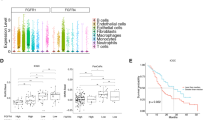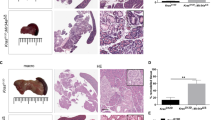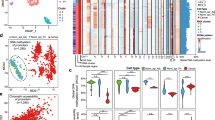Abstract
Pancreatic ductal adenocarcinoma (PDAC) is usually incurable. Contrary to genetic mechanisms involved in PDAC pathogenesis, epigenetic alterations are ill defined. Here, we determine the contribution of epigenetically silenced genes to the development of PDAC. We analyzed enriched, highly methylated DNAs from PDACs, chronic pancreatitis (CP) and normal tissues using CpG island microarrays and identified WNK2 as a prominent candidate tumor suppressor gene being downregulated early in PDAC development. WNK2 was further investigated in tissue microarrays, methylation analysis of early pancreatic intraepithelial neoplasia (PanIN), mouse models for PDAC and pancreatitis, re-expression studies after demethylation, and cell growth assays using WNK2 overexpression. Demethylation assays confirmed the link between methylation and expression. WNK2 hypermethylation was higher in tumor than in surrounding inflamed tissues and was observed in PanIN lesions as well as in a PDAC mouse model. WNK2 mRNA and protein expressions were lower in PDAC and CP compared with normal tissues both in patients and mouse models. Overexpression of WNK2 led to reduced cell growth, and WNK2 expression in tissues correlated negatively with pERK1/2 expression, a downstream target of WNK2 responsible for cell proliferation. Downregulation of WNK2 by promoter hypermethylation occurs early in PDAC pathogenesis and may support tumor cell growth via the ERK–MAPK pathway.
This is a preview of subscription content, access via your institution
Access options
Subscribe to this journal
Receive 50 print issues and online access
$259.00 per year
only $5.18 per issue
Buy this article
- Purchase on Springer Link
- Instant access to full article PDF
Prices may be subject to local taxes which are calculated during checkout







Similar content being viewed by others
References
Ghaneh P, Costello E, Neoptolemos JP . Biology and management of pancreatic cancer. Postgrad Med J 2008; 84: 478–497.
Bardeesy N, DePinho RA . Pancreatic cancer biology and genetics. Nat Rev Cancer 2002; 2: 897–909.
Hezel AF, Kimmelman AC, Stanger BZ, Bardeesy N, DePinho RA . Genetics and biology of pancreatic ductal adenocarcinoma. Genes Dev 2006; 20: 1218–1249.
Goggins M . Molecular markers of early pancreatic cancer. J Clin Oncol 2005; 23: 4524–4531.
Sato N, Fukushima N, Maitra A, Matsubayashi H, Yeo CJ, Cameron JL et al. Discovery of novel targets for aberrant methylation in pancreatic carcinoma using high-throughput microarrays. Cancer Res 2003; 63: 3735–3742.
Omura N, Li CP, Li A, Hong SM, Walter K, Jimeno A et al. Genome-wide profiling of methylated promoters in pancreatic adenocarcinoma. Cancer Biol Ther 2008; 7: 1146–1156.
Vincent A, Omura N, Hong S-M, Jaffe A, Eshleman J, Goggins M . Genome-wide analysis of promoter methylation associated with gene expression profile in pancreatic adenocarcinoma. Clin Cancer Res 2011; 17: 4341–4354.
Sipos B, Frank S, Gress T, Hahn S, Klöppel G . Pancreatic intraepithelial neoplasia revisited and updated. Pancreatology 2009; 9: 45–54.
Buchholz M, Braun M, Heidenblut A, Kestler HA, Klöppel G, Schmiegel W et al. Transcriptome analysis of microdissected pancreatic intraepithelial neoplastic lesions. Oncogene 2005; 24: 6626–6636.
Sato N, Fukushima N, Hruban RH, Goggins M . CpG island methylation profile of pancreatic intraepithelial neoplasia. Mod Pathol 2008; 21: 238–244.
Jansen M, Fukushima N, Rosty C, Walter K, Altink R, Heek Tv et al. Aberrant methylation of the 5' CpG island of TSLC1 is common in pancreatic ductal adenocarcinoma and is first manifest in high-grade PanINs. Cancer Biol Ther 2002; 1: 284–287.
Fukushima N, Sato N, Ueki T, Rosty C, Walter KM, Wilentz RE et al. Aberrant Methylation of Preproenkephalin and p16 Genes in Pancreatic Intraepithelial Neoplasia and Pancreatic Ductal Adenocarcinoma. Am J Pathol 2002; 160: 1573–1581.
Peng D-F, Kanai Y, Sawada M, Ushijima S, Hiraoka N, Kitazawa S et al. DNA methylation of multiple tumor-related genes in association with overexpression of DNA methyltransferase 1 (DNMT1) during multistage carcinogenesis of the pancreas. Carcinogenesis 2006; 27: 1160–1168.
Lowenfels AB, Maisonneuve P, Cavallini G, Ammann RW, Lankisch PG, Andersen JR et al. Pancreatitis and the Risk of Pancreatic Cancer. N Engl J Med 1993; 328: 1433–1437.
Matsubayashi H, Canto M, Sato N, Klein A, Abe T, Yamashita K et al. DNA methylation alterations in the pancreatic juice of patients with suspected pancreatic disease. Cancer Res 2006; 66: 1208–1217.
Gold DV, Goggins M, Modrak DE, Newsome G, Liu M, Shi C et al. Detection of Early-Stage Pancreatic Adenocarcinoma. Cancer Epidemiol Biomarkers Prev 2010; 19: 2786–2794.
Liggett T, Melnikov A, Yi Q-l, Replogle C, Brand R, Kaul K et al. Differential methylation of cell-free circulating DNA among patients with pancreatic cancer versus chronic pancreatitis. Cancer 2010; 116: 1674–1680.
Schilling E, Rehli M . Global, comparative analysis of tissue-specific promoter CpG methylation. Genomics 2007; 90: 314–323.
Moniz S, Matos P, Jordan P . WNK2 modulates MEK1 activity through the Rho GTPase pathway. Cellular Signalling 2008; 20: 1762–1768.
Moniz S, Veríssimo F, Matos P, Brazão R, Silva E, Kotevelets L et al. Protein kinase WNK2 inhibits cell proliferation by negatively modulating the activation of MEK1/ERK1/2. Oncogene 2007; 26: 6071–6081.
Hong C, Moorefield KS, Jun P, Aldape KD, Kharbanda S, Phillips HS et al. Epigenome scans and cancer genome sequencing converge on WNK2, a kinase-independent suppressor of cell growth. Proc Natl Acad Sci USA 2007; 104: 10974–10979.
Jun P, Hong C, Lal A, Wong JM, McDermott MW, Bollen AW et al. Epigenetic silencing of the kinase tumor suppressor WNK2 is tumor-type and tumor-grade specific. Neuro-Oncology 2008; 11: 414–422.
Lenertz LY, Lee B-H, Min X, Xu B-e, Wedin K, Earnest S et al. Properties of WNK1 and implications for other family members. J Biol Chem 2005; 280: 26653–26658.
Xu B-e, Stippec S, Lenertz L, Lee B-H, Zhang W, Lee Y-K et al. WNK1 activates ERK5 by an MEKK2/3-dependent mechanism. J Biol Chem 2004; 279: 7826–7831.
Sun X, Gao L, Yu RK, Zeng G . Down-regulation of WNK1 protein kinase in neural progenitor cells suppresses cell proliferation and migration. J Neurochem 2006; 99: 1114–1121.
Haas BR, Cuddapah VA, Watkins S, Rohn KJ, Dy TE, Sontheimer H . With-No-Lysine Kinase 3 (WNK3) stimulates glioma invasion by regulating cell volume. Am J Physiology—Cell Physiol 2011; 301: C1150–C1160.
Grapin-Botton A . Ductal cells of the pancreas. Int J Biochem Cell Biol 2005; 37: 504–510.
Heller A, Zörnig I, Müller T, Giorgadze K, Frei C, Giese T et al. Immunogenicity of SEREX-identified antigens and disease outcome in pancreatic cancer. Cancer Immunol, Immunother 2010; 59: 1389–1400.
Kong B, Michalski CW, Erkan M, Friess H, Kleeff J . From tissue turnover to the cell of origin for pancreatic cancer. Nat Rev Gastroenterol Hepatol 2011; 8: 467–472.
Meloche S, Pouyssegur J . The ERK1//2 mitogen-activated protein kinase pathway as a master regulator of the G1- to S-phase transition. Oncogene 2007; 26: 3227–3239.
Hartwig W, Hackert T, Hinz U, Gluth A, Bergmann F, Strobel O et al. Pancreatic cancer surgery in the new millennium: better prediction of outcome. Ann Surg 2011; 254: 311–319.
Strobel O, Dor Y, Stirman A, Trainor A, Fernández-del Castillo C, Warshaw AL et al. Beta cell transdifferentiation does not contribute to preneoplastic/metaplastic ductal lesions of the pancreas by genetic lineage tracing in vivo. Proc Natl Acad Sci 2007; 104: 4419–4424.
Niederau C, Ferrell L, Grendell J . Caerulein-induced acute necrotizing pancreatitis in mice: protective effects of proglumide, benzotript, and secretin. Gastroenterology 1985; 88: 1192–1204.
Jensen JN, Cameron E, Garay MVR, Starkey TW, Gianani R, Jensen J . Recapitulation of elements of embryonic development in adult mouse pancreatic regeneration. Gastroenterology 2005; 128: 728–741.
Pinho AV, Rooman I, Reichert M, De Medts N, Bouwens L, Rustgi AK et al. Adult pancreatic acinar cells dedifferentiate to an embryonic progenitor phenotype with concomitant activation of a senescence programme that is present in chronic pancreatitis. Gut 2011; 60: 958–966.
Means AL, Meszoely IM, Suzuki K, Miyamoto Y, Rustgi AK, Coffey RJ et al. Pancreatic epithelial plasticity mediated by acinar cell transdifferentiation and generation of nestin-positive intermediates. Development 2005; 132: 3767–3776.
Hingorani SR, Petricoin Iii EF, Maitra A, Rajapakse V, King C, Jacobetz MA et al. Preinvasive and invasive ductal pancreatic cancer and its early detection in the mouse. Cancer Cell 2003; 4: 437–450.
Kuhmann C, Weichenhan D, Rehli M, Plass C, Schmezer P, Popanda O . DNA methylation changes in cells regrowing after fractioned ionizing radiation. Radiother Oncol 2011; 101: 116–121.
Ehrich M, Nelson MR, Stanssens P, Zabeau M, Liloglou T, Xinarianos G et al. Quantitative high-throughput analysis of DNA methylation patterns by base-specific cleavage and mass spectrometry. PNAS 2005; 102: 15785–15790.
Acknowledgements
We would like to thank Reinhard Gliniorz, Oliver Mücke, Jana Petersen, Peter Waas and Otto Zelezny for their technical support, Dr Marta Faryna and Dr Carolin Konermann for discussions regarding the MCIp/microarray assays, Anna Poetsch and Christopher Schmidt for experimental advices, Dr Rainer Claus and Dr Christopher Oakes for stimulating discussions and Dr Ming-Sound Tsao (Ontario Cancer Institute, Toronto, Canada) for providing us the HPDE6-E6E7 cell line. This work is supported by grants from the Cancer Institute New South Wales, Australia (10FRL203 fellowship), from the German Federal Ministry of Education and Research (PKB-01GS08114) and from the German Federal Ministry of Education and Research as part of the PaCaNet consortium within the NGFN program. We thank the Fulbright commission in Germany and the US State Department for providing external funding (TK).
Author information
Authors and Affiliations
Corresponding author
Ethics declarations
Competing interests
The authors declare no conflict of interest.
Additional information
Supplementary Information accompanies this paper on the Oncogene website
Rights and permissions
About this article
Cite this article
Dutruel, C., Bergmann, F., Rooman, I. et al. Early epigenetic downregulation of WNK2 kinase during pancreatic ductal adenocarcinoma development. Oncogene 33, 3401–3410 (2014). https://doi.org/10.1038/onc.2013.312
Received:
Revised:
Accepted:
Published:
Issue Date:
DOI: https://doi.org/10.1038/onc.2013.312
Keywords
This article is cited by
-
Pancreatic Cancer: Genetic Conditions and Epigenetic Alterations
Journal of Gastrointestinal Surgery (2023)
-
An update regarding the role of WNK kinases in cancer
Cell Death & Disease (2022)
-
Long non-coding RNA LINC00858 exerts a tumor-promoting role in colon cancer via HNF4α and WNK2 regulation
Cellular Oncology (2020)
-
LINC00858 knockdown inhibits gastric cancer cell growth and induces apoptosis through reducing WNK2 promoter methylation
Cellular Oncology (2020)
-
Epigenetic Mechanisms of Pancreatobiliary Fibrosis
Current Treatment Options in Gastroenterology (2019)



